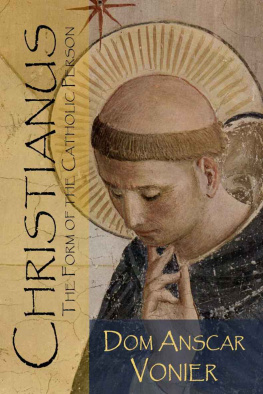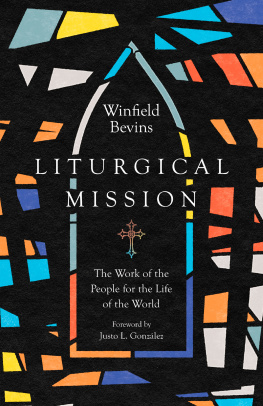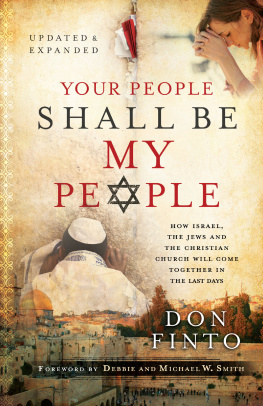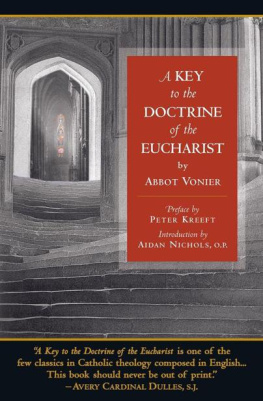The People of God
by
Dom Anscar Vonier, O.S.B.
Abbot of Buckfast

2013
Nihil Obstat
Reginaldus Phillips, S.Th.L., Censor deputatus
Imprimatur
L. Can. Evans., Vic Gen.
Westminster, April 21, 1937
The Nihil Obstat and Imprimatur are official declarations that a book or pamphlet is free of doctrinal or moral error. No implication is contained therein that those who have granted the Nihil Obstat and the Imprimatur agree with the content, opinions or statements expressed.
This book was originally published in 1937 by Burnes, Oates, and Washburne.
Copyright 2013 Assumption Press.
Cover image:. The Miracle of the Five Loaves, Jacopo Tintoretto, 1547
Contents
Preface
With the furious assaults on religion by the powers of evil, the temptation may come to the pious to retire into a sort of spiritual solitude because they despair of the victory of organized Christianity. Each soul for itself, they seem to say, a united front is no longer possible on the part of believers.
The following simple pages are written on purpose to combat this not uncommon temptation. Instead of faltering we ought to feel more and more deeply our spiritual solidarity as one people of God. This short book is chiefly exhortatory for the hour of tribulation, so it has no pretensions to exhaust so vast a subject. When writing of the people of God, the whole range of supernatural life could be touched upon, as it would be appropriate and congenital to the matter. To do this would necessarily mean producing an immense treatise on Christian virtues; but such an effort would obscure the principal issue of the subject. So I shall confine myself to what will be mere sketches of the salient features of the theme. The end I have in view is to add my voice to many others, immensely more powerful, to rally Catholics into a fervent realization of their corporate existence.
ANSCAR VONIER, O.S.B., Abbot.
Buckfast, Easter, 1937.
Introduction
In this book it is my intention to explain the spiritual possibilities contained in the one term people of God. This appellation is not only frequent in Christian literature, it is directly scriptural; in fact, in the Scriptures of the New Testament it is used as often as the word Church, while it fills every page of the Old Testament. The titles people of God and Church stand, of course, for the same objective reality the believers in Christ considered as a unit. The appellations are co-extensive in their meaning. But this need not prevent our finding a definite form of spiritual instruction in the very circumstance that the Christians are a people of God as well as a Church. They are a Church which is also a people of God, or if we like to take it the other way, they are a people endowed with the dignity of a Church. The two notions supplement each other and help us to form a more complete conception of the nature of the assembly of Christs faithful.
The utterances concerning the Church in the New Testament are comparatively few, but they are immensely pregnant with meaning. Catholic theology, on the other hand, has expanded the idea of the Church with inexhaustible activity and has made of the doctrine of the Church a most superb monument of sanctified thought. The notion people of God is also generously treated in the New Testament, though not in the Gospels, for reasons to which I shall return. But the whole Old Testament is an endless presentment of the idea of a people of God, at least in an adumbrated and prophetic sense.
Catholic theology, however, has not developed this concept as it has developed the concept Church. The reason is to be found, I think, in this, that by Ecclesia the newness of the second dispensation and its profound originality as a divine institution is more forcibly brought home. We know that the Church means a plenitude of supernatural graces, an entirely divine institution, a creation of the Holy Spirit, a fullness of charismata; such features are not commonly associated with the word people. On the other hand, the acts of divine providence, the deeds of Gods mercy and justice, the varieties of human powers and merits, the tribulations and successes of life, the external works of religion and many other things of which we shall speak, denote more directly the ways of a people.
The same persons are, as already insinuated, the members of the Church and of the people and this in virtue of the same supernatural election through faith. But I think that our understanding of the mystery of Christs Church ought not to make us overlook all the possibilities contained in the repeated declarations of the inspired Word that we are the people of God. Much is to be learned from this proclamation by Gods messengers and there is a certain narrowness of treatment of the doctrine of the Church which is not an uncommon danger even for the theologian; his concept of the Church imperceptibly becomes too mystical and too internal. This narrowness is precisely corrected if we associate considerations concerning the people of God with the dogmas of the Church of Christ.
I do not pretend to say that it is possible to compose a thesis on the people of God with the same exactness which is to be found in the theological treatises on the Church; but as we possess the whole ancient Testament to draw from, it seems certain that there can be created a very strong external atmosphere in which the theology of the Church ought to move. Let us call it the popular atmosphere. By this we intend to convey that, lofty and holy as the Church is, she is still a peoples Church. A people is not defined by spiritual categories, but if it can be defined at all it is made clear through its classes of high and low, of rich and poor, of strong and weak, of sinner and just man. Let us say, moreover, that the notion of people adds to the notion Church in a permanent and irrefragable fashion the characteristic of externalness. If we consider the Church to be a people we are certainly saved from the danger of all those tendencies which seek to make of the Church an invisible society of saints and elect.
It is, then, in this sense that the following pages are written. It is my most ardent wish to make Catholics understand how manifold, how rich is their life in Christ; how they constitute in this world a great new society of whose existence the powers of evil are extremely jealous. Anticipating already some of the considerations that will occur in this book, may we not say that two great assaults have been made on the fortunes of Christendom? Protestantism set out, unconsciously perhaps, to strip Christianity of the glory of being a Church, one, undivided, holy Church; the movements, on the other hand, to which we give the generic name of modern revolution have made it their task to deprive Christianity of being a people in this world. There may be individual Christians, says the revolutionary of all hues, but they must not be a Christian society, a form of policy which takes its cue from the Gospel; he does not want a people of God; nationhood must be entirely secularized.
It would be too presumptuous to say that these modest pages are written against modern revolution; they are written for Catholics themselves, so that they be renewed in that happiness which ought to be theirs because they are truly Gods people.
The notion people is, of course, closely allied to that other concept kingdom. In Scriptural thought and phraseology the two words are interchangeable. This was true in the ancient dispensation even before there were kings in Israel, as Jehovah Himself was always the one true King. The relationship between the earthly king of Israel and his people is expressed in the homage offered to David:
Next page





